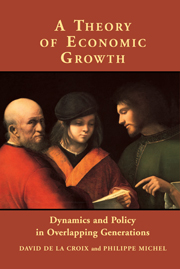3 - Policy
Published online by Cambridge University Press: 29 October 2009
Summary
The overlapping generations model provides an interesting toolkit to analyze various types of policies. In particular, it is the requisite tool for studying intergenerational distribution issues, such as the design of pension schemes. In this chapter, we devote our attention to different balanced budget policies for which an overlapping generations setup is of significant interest. Policies associated with public debt will be considered in chapter 4.
In a first section, we introduce lump-sum transfers in the competitive model of chapter 1 and study the policies designed to decentralize the allocation chosen by the benevolent planner. We show that any Pareto-optimal allocation can be decentralized with lump-sum transfers (Second Welfare Theorem). In the second section, the equilibrium with lump-sum transfers is used to study pension systems. The fact that transfers to the old are positive in a pension system allows us to further characterize the equilibrium and discuss the effect of pensions on capital accumulation. The third section is devoted to the study the role of government spending. We analyze, in section 4, the problem of financing such spending when the government cannot use lump-sum taxes (second-best policies). In section 5, we provide some applications and extensions.
LUMP-SUM TRANSFERS AND THE SECOND WELFARE THEOREM
Equilibrium with Lump-sum Transfers
We extend the model of chapter 1 and assume that there is a transfer system. There are lump-sum taxes at bearing on the young generation, and – zt bearing on the old generation. The tax at can be either positive or negative, but should remain smaller that the income of the young.
- Type
- Chapter
- Information
- A Theory of Economic GrowthDynamics and Policy in Overlapping Generations, pp. 129 - 178Publisher: Cambridge University PressPrint publication year: 2002



